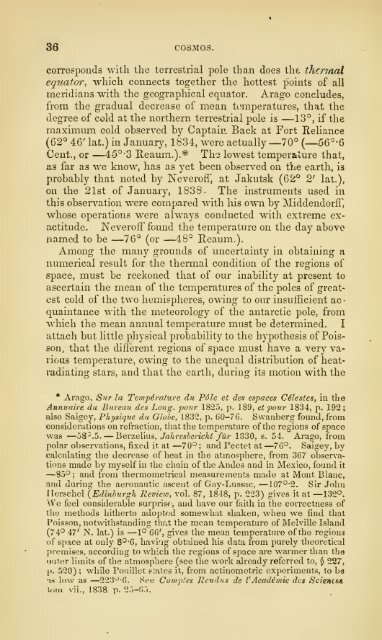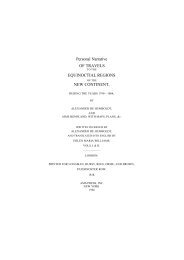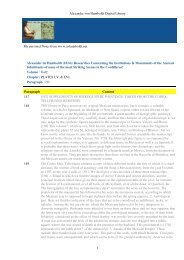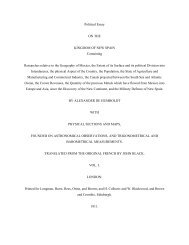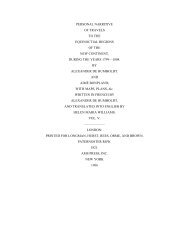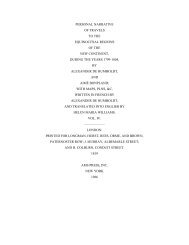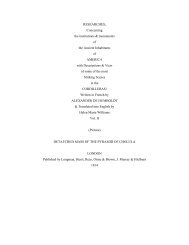36 COSMOS.corresponds with <strong>the</strong> terrestrial pole than does <strong>the</strong> <strong>the</strong>rmaleqitator, which connects toge<strong>the</strong>r <strong>the</strong> hottest points of allmeridians with <strong>the</strong> geographical equator. Arago concludes,from <strong>the</strong> gradual decrease of mean temperatures, thit <strong>the</strong>degree of cold at <strong>the</strong> nor<strong>the</strong>rn terrestrial pole is — 13^, if <strong>the</strong>maximum cold observed by Captain Back at Fort Rehance(62° 46' lat.) in Januar}^ 1834, w^ere actually —70° (—56^-6Cent., or — 45°-3 K-eaum.).^ The lowest temperature that,as far as we know, has as yet been observed on <strong>the</strong> earth, isprobably that noted by Neveroff, at Jakutsk (62° 2' lat.),on <strong>the</strong> 21st of January, 1838. The instruments used inthis observation were compared with his own by Middendorff,whose operations w^ere always conducted with extreme exactitude.Neveroff found <strong>the</strong> temperature on <strong>the</strong> day abovenamed to be — 76° (or— 48° Reaum.).Among <strong>the</strong> many grounds of uncertainty in obtaining anumerical result for <strong>the</strong> <strong>the</strong>rmal condition of <strong>the</strong> regions ofspace, must be reckoned that of our inability at present toascertain <strong>the</strong> mean of <strong>the</strong> temperatures of <strong>the</strong> poles of greatestcold of <strong>the</strong> two hemisp<strong>here</strong>s, owing to our insufficient acquaintance wdth <strong>the</strong> meteorology of <strong>the</strong> antarctic pole, fromwhich <strong>the</strong> mean annual temperature must be determined. Iattach but little physical probability to <strong>the</strong> hypo<strong>the</strong>sis of Poisson,that <strong>the</strong> different regions of space must have a very varioustemperature, owing to <strong>the</strong> unequal distribution of heatradiatmgstars, and that <strong>the</strong> earth, daringits motion with <strong>the</strong>* Arago, Snr la Tempiralure du Pole et des espaces Cilestes, in <strong>the</strong>Annuaire du Bureau des Long, jwnr 1825, p. 189, et pour 1834, p. 192;also Saigey, Physique du Globe, 1832, p. 60-76. Svvauberg found, fromconsiderations on refraction, that <strong>the</strong> temperature of <strong>the</strong> regions of spacewas — .58^.5. — Berzelius, Jahresbericht fur 1830, s. 54. Arago,— frompolar observations, fixed it at 70^ ; and Pectet at — 76°. Saigey, bycalculating <strong>the</strong> decrease of heat in <strong>the</strong> atmosp<strong>here</strong>, from 367 observationsmade by myself in <strong>the</strong> chain of <strong>the</strong> Andes and in Mexico, found it— 85°; and from <strong>the</strong>rmometrical measurements made — at Mont Blanc,and dui-ing <strong>the</strong> aeronautic ascent of Gay-Lussac, 107°-2. Sir JohnHorschel (Edinburgh Review, vol. 87, 1848, p. 223) gives it at —132°.We feel considerable surprisf ,and have our faith in <strong>the</strong> correctness of<strong>the</strong> methods hi<strong>the</strong>rto adopted somewhat shaken, when we find thatPoisson, notwithstanding that <strong>the</strong> mean temperature of Melville Island—(74° 47' N. lat.) is 1° 66', gives <strong>the</strong> mean temperature of <strong>the</strong> regionsof space at only 8°'6, having obtained his data from purely <strong>the</strong>oreticalpremises, according to which <strong>the</strong> regions of space are wai'mer than thaouter limits of <strong>the</strong> atmosp<strong>here</strong> (see <strong>the</strong> work already referred to, $ 227,p. .520) while Pouillet Stales ; it, from actinometric experiments, to ba•IS low as — 223^0. <strong>See</strong> Comptes Rcndus de VAcademic des Sciences.u,m vii., 1838 p. 25-65.
TEMPERATURE OF SPACE. 37whole solar system, receives its interna, heat from withoutwhile passing through hot and cold regions.*The question whe<strong>the</strong>r <strong>the</strong> <strong>the</strong>rmal conditions of <strong>the</strong> celestialregions, and <strong>the</strong> climates of individual portions of space,have sujSered important variations in <strong>the</strong> course of ages, depends mainly on <strong>the</strong> solution of a prohlem warmly discussedS^irby Wihiam Herschel : whe<strong>the</strong>r <strong>the</strong> nebulous masses aresubjected to progressive processes of formation, while <strong>the</strong> cosrriicalvapor is being condensed around one or more nuclei inaccordance "with <strong>the</strong> laws of attraction ?By such a condensationof cosmical vaiJor, heat must be liberated, as inevery transition of gases and fluids into a state of solidification.!If, in accordance with <strong>the</strong> most recent views, and<strong>the</strong> important observations of Lord R.osse and Mr. Bond, wemay assume that all nebulas, iiicluding those which <strong>the</strong> highestpower of optical instruments has hi<strong>the</strong>rto failed in resolving,are closely crowded stellar swarms, our faith in tliis perpetuallyaugmenting liberation of heat must necessarily bein some degree weakened. But even small consolidated cosmicalbodies Avhich appear on <strong>the</strong> field of <strong>the</strong> telescope asdistinguishable luminous points, may change <strong>the</strong>ir densityby combining in larger masses and ; many phenomena presentedby our own planetary system lead to <strong>the</strong> conclusionthat planets have been soUdified from a sfate of vapor, andthat <strong>the</strong>ir internal heat owes its origin to <strong>the</strong> fomiative processof conglomerated matter.Itmayat first sight seem hazardous to term <strong>the</strong> fearfullylow temperature of <strong>the</strong> regions of space (which varies between<strong>the</strong> freezing point of mercury and that of spirits ofwine) even indirectly henejicialto <strong>the</strong> habitable climates of<strong>the</strong> earth and to animal and vegetablelife. But in proof of<strong>the</strong> accuracy of <strong>the</strong> expression, we need only refer to <strong>the</strong> actionof <strong>the</strong> radiation of heat. The sun-warmed surface ofour planet, as well as <strong>the</strong> atmosp<strong>here</strong> to its outermost strata,freely radiate heat into space. The loss of heat which <strong>the</strong>yexperience arises from <strong>the</strong> difference of temperature between<strong>the</strong> vault of heaven and <strong>the</strong> atmospheric strata, and from <strong>the</strong>feebleness of tlie counter-radiation. How enormous wouldl?3 this loss of heat,$ if <strong>the</strong> regions of space,instead of <strong>the</strong>* <strong>See</strong> Poisson, ThioHe Mathim. de la Chalenr, p. 438.Accordingto him, <strong>the</strong> consolidation of <strong>the</strong> earth's strata began from <strong>the</strong> center, andadvanced gradually toward <strong>the</strong> surface; 'J 193, p. 429. Compare alsoCosmos, vol. i., p. 176, 177. t Cosmos, vol. i., p. 83, 84, 144.X" Were <strong>the</strong>re no atmosp<strong>here</strong>, a thcrmonietor freely exposed (at suit
- Page 1: m m>
- Page 9 and 10: CONTENTS OF VOL. III.INTRODUCTION.H
- Page 11 and 12: SPECIAL RESULTS OF OBSERVATIONla TH
- Page 13 and 14: INTRODUCTION. 7tiiieiital masses in
- Page 15 and 16: f.XTRODUOTiOPrSgradual development
- Page 17 and 18: INTRODUCTION.Ulabor, of wlach the l
- Page 19 and 20: INTRODUCTION. 13to ultimate princip
- Page 21 and 22: IM'llODUCTION. 13The so-called solu
- Page 23 and 24: 'INTRODUCTION. 17—plants and anim
- Page 25 and 26: INTRODUCTION.ISdistinctly adduces t
- Page 27 and 28: INTUODUCTION. 21the liurnaii race m
- Page 29 and 30: INTRODUCTION. 23result of Eome high
- Page 31 and 32: INTRODUCTION. 25Der and distaiiGe o
- Page 33 and 34: AS'xROGNOSY. 2*7A.rcturus, and Alde
- Page 35 and 36: THE REALMS OF SPACE, AND CONJECTURE
- Page 37 and 38: IHE PROPAGATION OF LIGHT. 31man wit
- Page 39 and 40: COSMICAL ETHER. 38arc separated by
- Page 41: RADIATING HEAT. 35*'whose action di
- Page 45 and 46: RESISTING MEDIUM. 39Btars,^ and iVo
- Page 47 and 48: FIRST TELESCOPE. 41the limits of an
- Page 49 and 50: DIOPTRIC TUBES. 43wliich were certa
- Page 51 and 52: POLARIZATION OF LIGHT. i5tia of the
- Page 53 and 54: POLARIZATION OF LIGHT. 4?mosplieric
- Page 55 and 56: VISIBILITY OF STARS. 4948 from Miza
- Page 57 and 58: VISIBILITY OF STARS. 5\etars fainte
- Page 59 and 60: NATURAL VISION. 53trated in a singl
- Page 61 and 62: VISIBILITY OF OBJECTS. 55Ifciis,whi
- Page 63 and 64: T^ISIBILITY OF STARS. 51that stars
- Page 65 and 66: U^JDULATION OF THE STARS. 5^cars ne
- Page 67 and 68: ASTRONOMICAL DISCO^ ERIES.l5iof Col
- Page 69 and 70: TELESOOPES..63,The advantages which
- Page 71 and 72: TELESCOPES. 05object-glasses of 15
- Page 73 and 74: TELESCOPES. 07eifiployment, hy Roiu
- Page 75 and 76: TELESCOrES. 69in ono of the numerou
- Page 77 and 78: TELESCOPES. 71fixed stars, since th
- Page 79 and 80: SCINTILLATION OF TJIE STARS. 73©cc
- Page 81 and 82: SCINTILLATION OF THE STARS. 75these
- Page 83 and 84: SCINTILLATION CF THE STARS. 7"^ol s
- Page 85 and 86: SCINTILLATION OP THE STARS. 79ghcrt
- Page 87 and 88: SCINTILLATION OF THE STARS. Siand f
- Page 89 and 90: SCINTILLATION OF THE STARS. 83creas
- Page 91 and 92: VELOCITY OF L-'GIIT. fc'5refraction
- Page 93 and 94:
VELOCITY OF ELECTRICITY. STbe satis
- Page 95 and 96:
STELLAR LIGHT. 81)to such views bec
- Page 97 and 98:
MAGNITUDES OF STARSDir;40 stars of
- Page 99 and 100:
ilOTOMETRIC METHODS. 1)3ing (in fro
- Page 101 and 102:
HOTOMETR'i'. 95Sir Jolin Herscliel
- Page 103 and 104:
PHOTOMETRY. 97his own words, the re
- Page 105 and 106:
PHOTOMETRIC SCALE. 99raoTOMi:TRic a
- Page 107 and 108:
PHOTOMETRIC SCALE. 101Stars of the
- Page 109 and 110:
tt.i.rfUMBER, DISTRIBUTION, AND COL
- Page 111 and 112:
NUMBER OF THE FIXED STARS. iOlHersc
- Page 113 and 114:
NUMliER OF TUB FIXED STARS. 101Tst
- Page 115 and 116:
NUMBER OF THE FIXED STARS. 109Star
- Page 117 and 118:
EARLY CATA'.OGUES. Illthat of Tycho
- Page 119 and 120:
PROGRESS OF ASTRONOMY. 113the labor
- Page 121 and 122:
STAR CATALOGUES 115La Caille, Tobia
- Page 123 and 124:
DISTRIBUTION OF THE FIXED STARS. 11
- Page 125 and 126:
ZODIACAL SIGNS. 119groups the for.n
- Page 127 and 128:
i,ODlACAL SIGNS. 121passage, pDjbaW
- Page 129 and 130:
AcliillesTHE FIXED STARS 123to tlio
- Page 131 and 132:
THE FIXED STARS. 123idea of transpa
- Page 133 and 134:
VELOCITY OF LIGHT.IS'/tne eye,diflr
- Page 135 and 136:
RAYS OF THE STARS. 12Switli a needl
- Page 137 and 138:
COLOU OF THE STARS. 131ifiope, ill
- Page 139 and 140:
SIRIU3. 133gjini,who invariably fol
- Page 141 and 142:
THE COLOR OF THE STARS 135Btars, St
- Page 143 and 144:
SOUTHERN STARS.ISTEentatioiis of De
- Page 145 and 146:
DISTRIBUTION OF STARS.13Sbeen made
- Page 147 and 148:
CLUSTERS OF STARS. 141tail of Scorj
- Page 149 and 150:
CLUSTERS OF STAR3. 143of Cambridge,
- Page 151 and 152:
MILKY WAY. 145be asciibed to irreso
- Page 153 and 154:
MILKY WA /. 147tioii of the souther
- Page 155 and 156:
MILKY WAY. 149of Ceplieus, and ther
- Page 157 and 158:
NEW STARS. 151ft1rat\im. is about e
- Page 159 and 160:
A^VV STARS. 153diminisii,. and the
- Page 161 and 162:
etweenTEMPORARY STARS. 155transitio
- Page 163 and 164:
TEMPORARY STARS.It>'/{g) March, 393
- Page 165 and 166:
TEMPORARY STARS. 159excitt
- Page 167 and 168:
N£VV STARS 161aetic process in the
- Page 169 and 170:
VANISHED STARS.1G3bricius as sudden
- Page 171 and 172:
PERIODICAL STARS. 165with uniform i
- Page 173 and 174:
VARIABLE STARS. 167That the periods
- Page 175 and 176:
VARIABLE STARS. 169perioJs of the m
- Page 177 and 178:
VARIABLE STARS. 171have loDg' appea
- Page 179 and 180:
VARIABLE STARS.17Jright ascension a
- Page 181 and 182:
VARIABLE STARS. 175The Huctaations,
- Page 183 and 184:
VARIABLE STARS. 11^lU brightuess at
- Page 185 and 186:
VARIABLE STARS. 179to the observati
- Page 187 and 188:
VARIABLE STARS. 181served by liLn.
- Page 189 and 190:
PROPER MOTION OF THE STARS. 183cuns
- Page 191 and 192:
_PROPER iMOTION OF THE STARS. If 5t
- Page 193 and 194:
PROPER MOTION OF THE STARS. 187A la
- Page 195 and 196:
DISTANCES OF THE STARS.Ibllniibsima
- Page 197 and 198:
DISTANCES OF THE STARS.19Jfiords, "
- Page 199 and 200:
Fixed Star.DISTANCES OF THE STARS.
- Page 201 and 202:
PROPER MOTION OF THE STARS. . 195li
- Page 203 and 204:
MOTION OF THE STARS. 197question na
- Page 205 and 206:
DOUBLE STARS. 199not the place to d
- Page 207 and 208:
OOUBLL STARS. 201distnnce from each
- Page 209 and 210:
DOUBLE &TAR3. 203The importance of
- Page 211 and 212:
DOUBLE STARS20ldation of this impor
- Page 213 and 214:
DOUBLE STARS 20*7most recent gives
- Page 215 and 216:
DOUBLE STARS.!2USstances In which a
- Page 217 and 218:
DOUBLE STARS.21 JOrion, we have a c
- Page 219:
DOUBLE STARS.213Elements ofthe Orbi
- Page 222 and 223:
neINDEX.Cosiiiical vnpor, question
- Page 224 and 225:
218 INDEX./^i-nerical rcctilta exce
- Page 230:
i's\ ''^:>


